When
Building Resilience
The Annual Public Health Poster Forum will be on April 1, 2022 from 1-5 p.m. at the College of Nursing, University of Arizona, and virtually for remote attendance!
The Mel and Enid Zuckerman College of Public Health Poster Forum keynote presentation and poster presentations will be held in a hybrid format. The theme this year will be Building Resilience. All UA undergraduate and graduate students are invited to submit their research and community engagement projects relating to public health.
Agenda
- 1:00–3:00pm: Poster presentations
- 3:00–4:00pm: Keynote speakers
- Dr. Greg Collins, PhD, MPH
Presentation: The Rise of Resilience in International Development - Dr. William Simmons, PhD, MA
Presentation: Resilience and Posttraumatic Growth among Rohingya Refugees in Bangladesh - Dr. Nicole P. Yuan, PhD, MPH
Presentation: Uncovering Resilience in Narratives from Young People Living in Southern Appalachian Communities
- Dr. Greg Collins, PhD, MPH
- 4:00–4:30pm: Q&A for keynote speakers
- 4:30–5:00pm: Award presentations
Keynote Speakers
- Dr. Greg Collins, PhD, MPH
- Greg Collins is the Associate Vice President of Resilience and International Development and a Research Professor at the University of Arizona. Dr. Collins previously served as the Deputy Assistant Administrator (Senior Executive Service) at the United States Agency for International Development (USAID) where he led the Bureau for Resilience and Food Security. In that role he provided strategic vision and oversight for the U.S. Government’s global hunger and food security initiative and USAID’s efforts to build resilience in areas of recurrent crises. Greg also served as USAID’s first Resilience Coordinator and, previously, the founding Director of USAID’s Center for Resilience. He is a globally recognized thought leader on resilience and played a lead role elevating resilience in USAID and international development. He earned his PhD in Economic Sociology from UC Davis, his MPH from Tulane University, and his BA in Anthropology from UC Davis.
- Presentation - The Rise of Resilience in International Development: This presentation will outline the rise of resilience and an analytic, programmatic and organizing concept in the field of international development beginning during the 2011-12 crisis in the Horn of Africa to the present day triple threat of Covid-19, conflict and the accelerating impacts of climate change. The importance of health, as a subset of shocks and stresses, an outcome of interest, and as a source of resilience for protecting other outcomes will also be explored.
- Dr. William Simmons, PhD, MA
- William Paul Simmons, Ph.D., is a Professor of Gender & Women's Studies and Director of the online Human Rights Practice graduate program at the University of Arizona. His research is highly interdisciplinary; using theoretical, legal, and empirical approaches to advance human rights for marginalized populations around the globe. His books include Joyful Human Rights (University of Pennsylvania Press, 2019), Human Rights Law and the Marginalized Other (Cambridge UP, 2011), An-archy and Justice: An Introduction to Emmanuel Levinas’ Political Thought (Lexington, 2003). His articles have appeared in such journals as; Perspectives on Politics, DuBois Review, Journal of Human Rights, International Journal of Feminist Politics, International Migration Review, Violence Against Women, Yale Human Rights & Development Law Journal, The Journal of International Human Rights, Social Science Quarterly, and Philosophy and Social Criticism. He has served as a consultant on human rights and social justice issues in The Gambia, Niger, Nigeria, Bangladesh, China, Mexico, and the United States.
- Presentation - Resilience and Posttraumatic Growth among Rohingya Refugees in Bangladesh: In 2017, approximately 700,000 Rohingya fled ethnic cleansing in their native Myanmar and settled in neighboring Bangladesh where they now reside in the world's largest refugee camps. While provided housing, food, water, and sanitation, the Rohingya are dealing with an immense amount of trauma. The Human Rights Practice program at UA is working with a multinational team to develop a protocol to measure resilience and posttraumatic growth among Rohingya youth. We are especially interested in measuring the effects of a cutting-edge participatory public art intervention developed by the NGO Artolution.
- Dr. Nicole P. Yuan, PhD, MPH
- Nicole P. Yuan, PhD, MPH, is an Associate Professor in the Department of Health Promotion Sciences and the Program Director of Health Behavior Health Promotion. Her research interests include adverse life experiences, substance use and misuse, coping strategies, and resilience among Indigenous and other underserved populations. She utilizes community-based participatory principles and mixed methods in most of her projects. She was a co-author of the Guidelines for Community Advisory Boards to Engage in Health Research. She is collaborating with Tucson Indian Center on the design, implementation, and evaluation of a Fetal Alcohol Spectrum Disorders prevention program for American Indian and Alaska Native young adults. Dr. Yuan is also collaborating with UArizona faculty on studies that examine the feasibility of recruiting diverse older healthcare workers for health promotion research and feasibility, acceptability, and effectiveness of Tai Chi interventions. Dr. Yuan maintains an active psychology license in Arizona.
- Presentation - Uncovering Resilience in Narratives from Young People Living in Southern Appalachian Communities: This presentation will focus on a study on self-identified low point life experiences and positive and negative responses among Appalachian young people. We analyzed 71 narratives from young people, ages 12-24, who participated in a mixed methods study on resilience and psychosocial strengths among Southern Appalachian communities. The young people reported several different types of adversities. Some of them reported “compounded” low point experiences with the occurrence of multiple negative events. The young people described a variety of positive and negative responses to their low points experiences. The findings may be used to inform the development of strength-based and resilience-focused interventions for Appalachian young people and communities.
Pre-Event Activity: Listen to the Roundtable Discussion Hosted by the What’s Up Public Health Podcast
You can hear the discussion now or any time before the Forum, hosted by Maria Valdez, MPH, from the podcast "What's Up Public Health."
Listen to the Roundtable on Spotify (Click Here ) or Apple Podcasts (Click Here)
- What’s Up Public Health Host
- Maria Guadalupe Valdez, MPH – Maria Valdez, MPH, graduated from the UArizona Zuckerman College of Public Health with her master’s degree in Public Health Practice in May 2020. Her thesis was “How Policy Affects the Policy-Making Process - A Policy Brief and Recommendations on How to Pass a Bill.” Valdez’s passion for public health included research on the social determinants of health, population health, and delivery of care, all factors that informed her push for a more equitable and effective health policy. She is also a journalist and former contributor to HuffPost. Valdez produces the podcast, What’s Up Public Health with her Boston University colleague Shamirah Davenport. To raise awareness about the health challenges faced by people of color, they created the podcast to engage a wide range of people to participate in conversations about current public health topics from the perspective of diverse communities.
- Guest Speakers/Public Health Poster Forum Judges
- Dr. Mona Arora, PhD, MSPH - Dr. Mona Arora has over 13 years of experience in emergency preparedness, workforce development, and community engagement. She has worked extensively with rural and tribal communities and partnered with local health departments to facilitate community resilience for public health emergencies, including disease outbreaks such as Pandemic Influenza. Dr. Arora has been a member of the UArizona Campus Incident Response Team Pandemic Influenza Committee since 2008 and is also the Co-Chair of CIRT’s Medical Countermeasures Subgroup. In Spring 2020, she was asked to be a UArizona’s Incident Command System member to assist in the campus response to the COVID19 pandemic. Dr. Arora continues to serve in this capacity on a multi-disciplinary collaborative team for the University of Arizona campus.
- Dr. Conrad Clemens, MD, MPH - Conrad J. Clemens, MD, MPH is the associate dean for Graduate Medical Education at the University of Arizona College of Medicine. He is responsible for overseeing the 600 residents and fellows who make up the University’s 42 residency and fellowship programs. Dr. Clemens, a professor of Pediatrics, has been on faculty at the College of Medicine since 2002. He has served in a number of leadership roles, including director of the Pediatric Residency Program, co-director of the Pediatric-Emergency Medicine Residency Program, chair of the Graduate Medical Education Committee, associate head of the Department of Pediatrics, and chief of the Section of General Pediatrics. Dr. Clemens has received numerous teaching awards and is involved in a number of clinical research projects in his field.
- Zaida Dedolph, MPH – Zaida was thrilled to join the team at Children's Action Alliance (CAA) in October 2019. Previously, she has worked to enact change at the individual, organizational, and systems levels. Her legislative experience has focused on addressing barriers to health equity at both the state and federal levels, including access to physical and behavioral health care, housing, food security, and financial wellbeing. Zaida serves as director of public policy for the Arizona Public Health Association. She graduated magna cum laude from Loyola University Chicago with a Bachelor of Science degree in Anthropology with a concentration in bioethics and holds a master’s degree in Public Health from the University of Arizona.
- Dr. Laura Gronewold, PhD - Laura Gronewold, PhD., is a Lecturer and Undergraduate Internship Coordinator in the Department of Health Promotion Sciences at the University of Arizona Mel and Enid Zuckerman College of Public Health. Dr. Gronewold’s professional career has involved working in both academia and community settings, focusing on using critical and empathetic dialogue to improve individuals and communities. As Director of Education for Ben’s Bells Project in Tucson, she developed curricula and led workshops about how social-emotional skills build community and affect positive social change. She also created a community education program to promote social justice through guided dialogue with other community partners. Other community projects include serving as Project Manager for The Loft Cinema’s presentation of the Human Rights Watch Film Festival and serving as consulting scholar on Kore Press’ Coming in Hot Civil Discourse Tour.
RVSP By Friday, March 25th: forms.gle/zUcFbUaamEQKNppn9
Event Location: Health Sciences – Tucson Campus, College of Nursing - Building 203, Rooms 115 and 117 - 1305 N. Martin Ave. Tucson, AZ 85721
Zoom Link: arizona.zoom.us/j/87314379298
For questions or additional information, contact: Samantha Werts (swerts@email.arizona.edu) and Niraly Patel (niralyp@arizona.edu).
- 2018 Research Poster Winners
-
First Place
Breanne Lott - “Silo-Busting in a Health Department: Studying Intra-Organizational Collaboration”
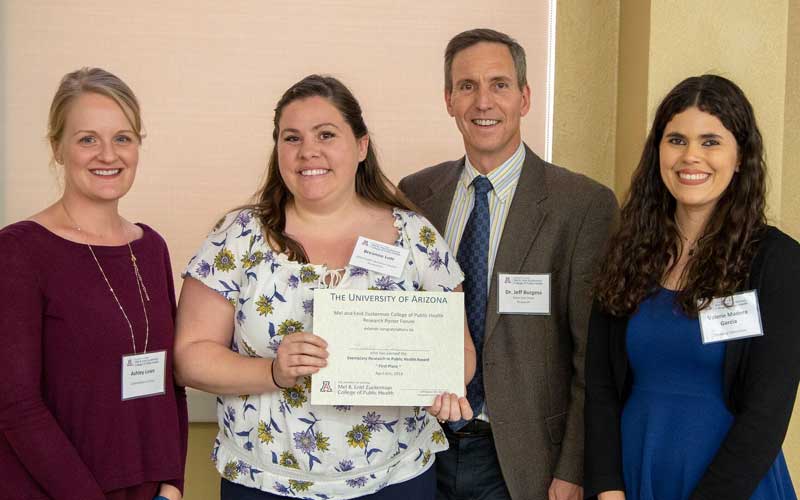
Second Place
Karen Lutrick - “Bullying and depression in Latino youth: A systematic review”
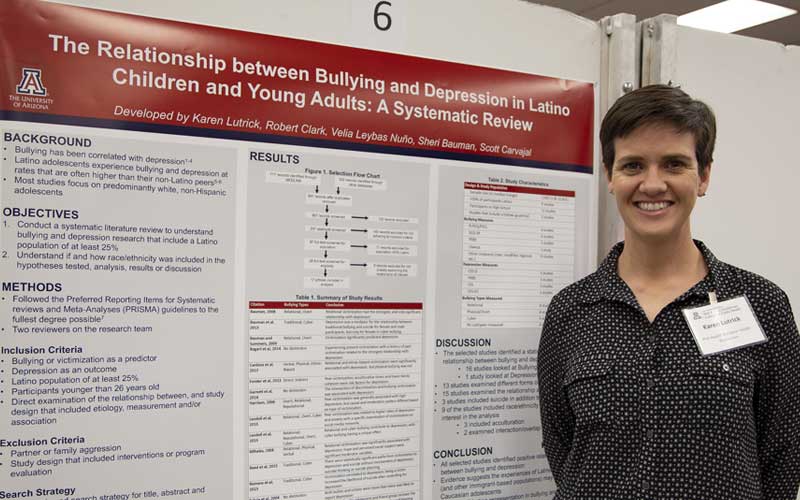
Third Place
Amanda Wilson - “How much are surfaces to blame in norovirus outbreaks?”
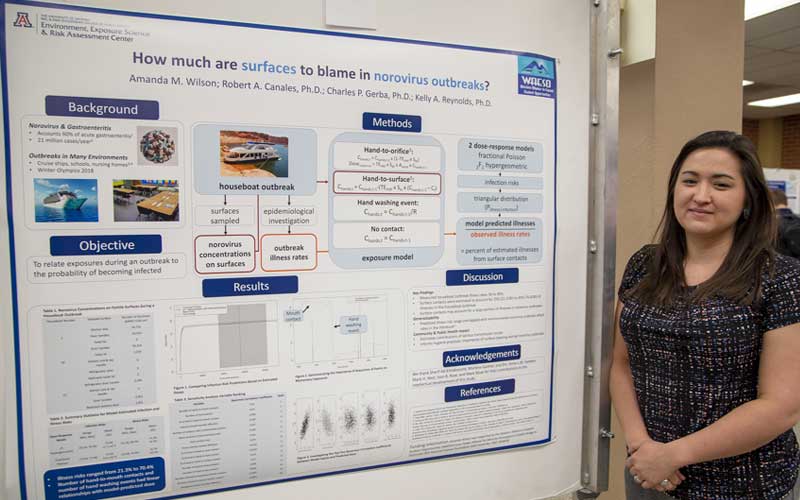
2018 Community Engagement Poster Winners
First Place
Kathryn Tucker - “The Role of Healthy Food Boxes in Chronic Disease Management Programs”
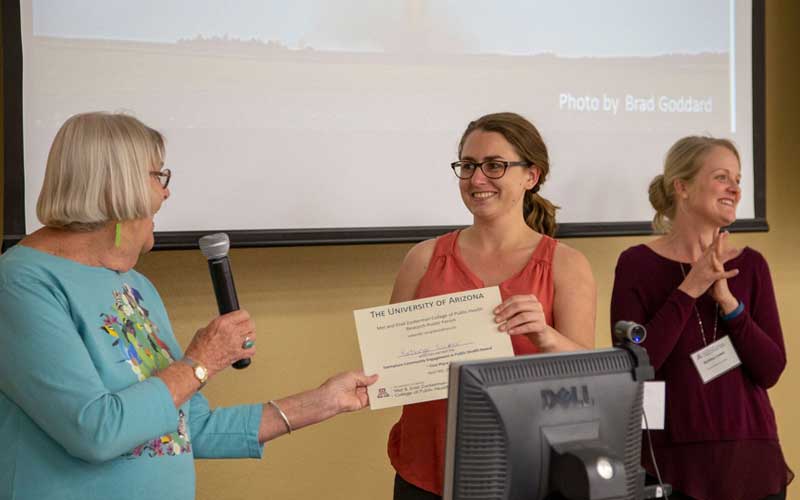
Second Place
Juanita Trejo - “Development and Implementation of a Database for NAMI of Southern Arizona”
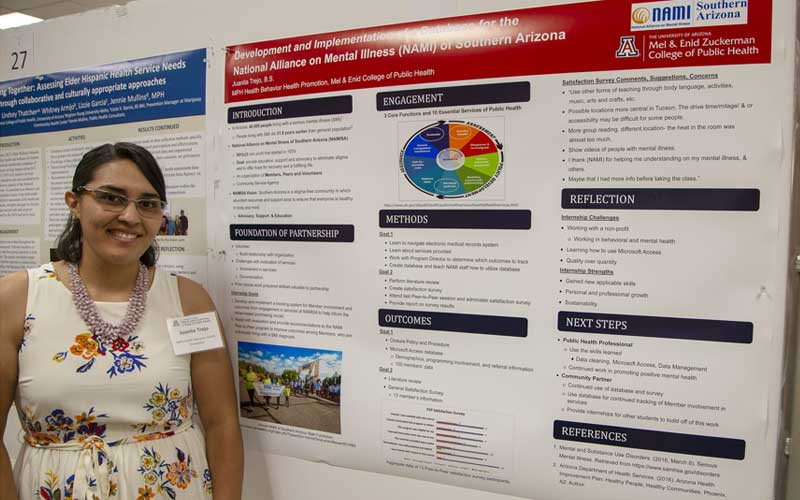
Third Place
Lindsey Thatcher - “Cresciendo Juntos – Growing Together: Assessing Elder Hispanic Health Service Needs”
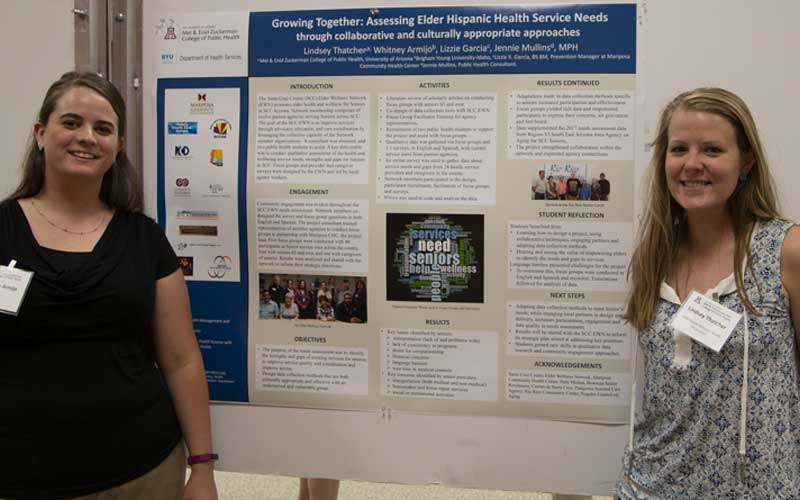
- 2017 Previous Winners
-
Award for Best Example of Science in Service to Society
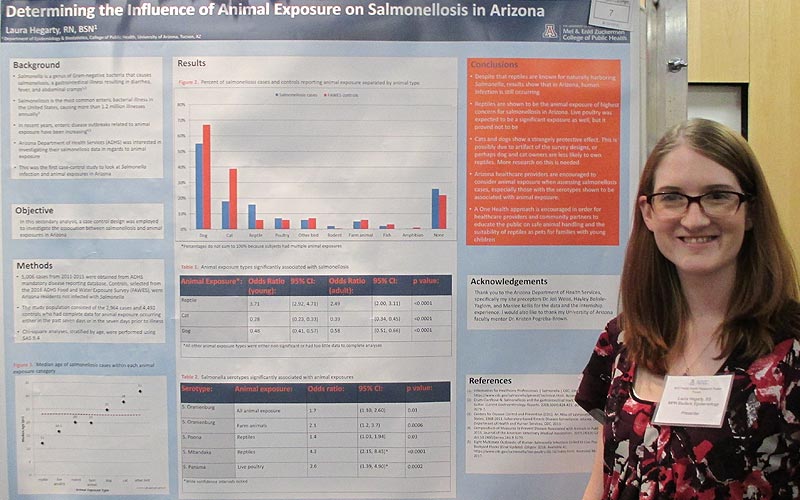
Laura Hegarty - “Determining the Influence of Animal Exposure on Salmonellosis in Arizona”
Award for Best Poster Highlighting Original Research
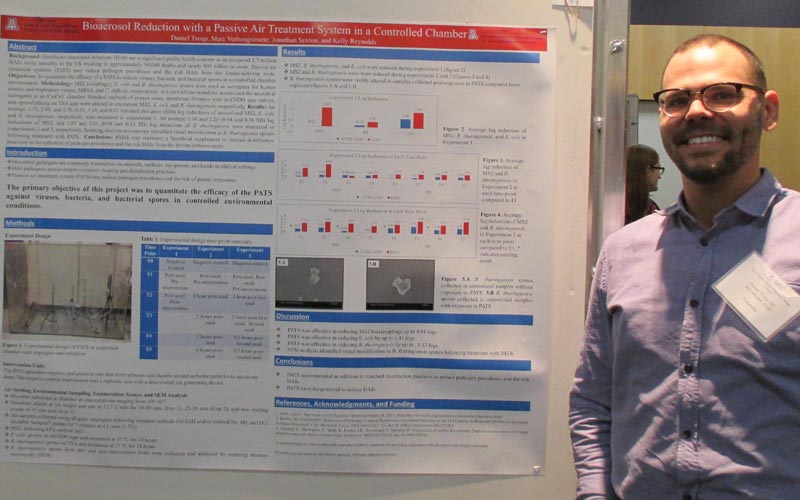
Daniel Troup - “Bioaersol Reduction with a Passive Air Treatment System in a Controlled Chamber”
Community Engagement Posters
- First Place: Graciela Jauregui - “Healthy Farms/Campos Saludables”
- Second Place: Allie Kaufman, Nicole Lorona, Ariel Hayes, Joseph Moseley - “Project SHARE”
- Third Place: Kathryn Tucker - “Engaging Mothers to Break the Cycle of Poverty”
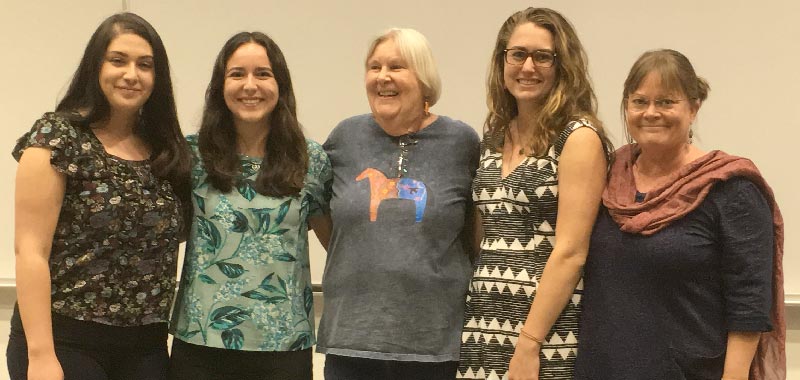 Left to right: Graciela Jauregui, Nicole Lorona, Jill Guernsey de Zapien, Kathryn Tucker, and Jean McClelland
Left to right: Graciela Jauregui, Nicole Lorona, Jill Guernsey de Zapien, Kathryn Tucker, and Jean McClelland
Contacts
Samantha Werts and Niraly Patel
swerts@email.arizona.edu | niralyp@arizona.edu

